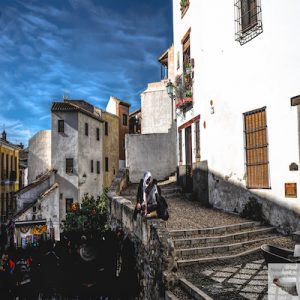12 Jul ORIGINS OF GRANADA

In this new chapter we will cover the origins of Granada. Without any historical doubt, the city was born
on the Albaicin hill, where archeologists discovered the VIII AC Iberian walls that defended the first
urban settlement in the city, as well as numerous Roman ruins.
Arabs joined the first civilizations with their arrival in the VIII century, ruling until 1492. The city saw its
most splendorous times under the Zirid Dynasty, Berbers from Northern Africa, in the XI Century, and
centuries later under the Nasrid Dynasty. Every civilization that set foot in Granada left its mark in every
corner of the Albaicin.
The beauty of the Albaicin owes much to its tortuous streetscape, a reflection of the many civilizations it
has witnessed. Its impossible but astonishing urbanism, alien to any coherent planning, provides the
neighborhood with a unique and intangible charm. Roaming its streets feels like being in a village rather
than in a city, with old neighbors as well as new ones who give the Albaicin such a unique allure.
But let’s start from the beginning:
As mentioned before, the origins of the city of Granada are found on the hill where the Albaicin stands
and its proximities. Archeological sites have revealed human presence since very early dates, with the
first permanent settlements in the city dating back four thousand years AC. Circular and elliptic huts
have been discovered from the Bronze Age.
The Phoenician merchants connected the Eastern and Western Mediterranean, founding colonies along
its coast, such as Almuñécar and Salobreña on the coast of Granada. From these enclaves they ventured
into the interior of the Peninsula in search of metals and other natural resources. Phoenician Culture
merged with that of the indigenous inhabitants, thus giving birth to an Iberian culture that played a very
prominent role in this part of the Peninsula.
But let’s be more precise about the origin of Granada. The first primitive Iberian settlement of Granada
was located in a square called Minas, in the Albacin, from where the urban expansion began. This was a
privileged location given the easy access to the coast, the fertile lands for agriculture in the surroundings
of Granada, and the abundance of gold and other precious metals in the waters of the Darro, the river
that divides the hills of the Alhambra and the Albaicin.
It is therefore from this Iberian settlement that the city expanded and evolved until present day, with
each civilization and each culture leaving its own mark along the way.

